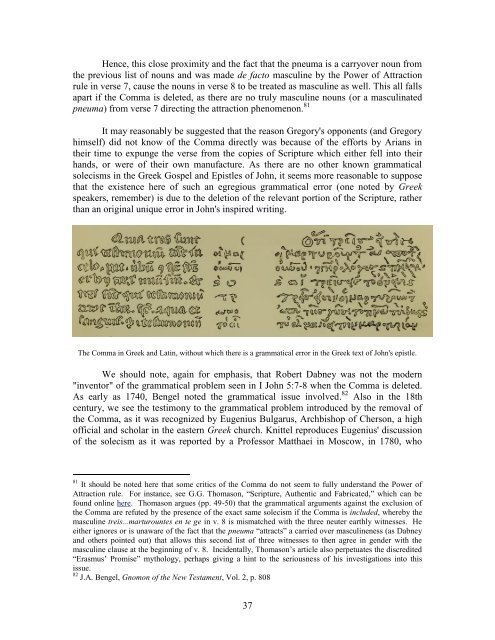A Defense of the Johannine Comma - Study to Answer.Net
A Defense of the Johannine Comma - Study to Answer.Net
A Defense of the Johannine Comma - Study to Answer.Net
Create successful ePaper yourself
Turn your PDF publications into a flip-book with our unique Google optimized e-Paper software.
Hence, this close proximity and <strong>the</strong> fact that <strong>the</strong> pneuma is a carryover noun from<br />
<strong>the</strong> previous list <strong>of</strong> nouns and was made de fac<strong>to</strong> masculine by <strong>the</strong> Power <strong>of</strong> Attraction<br />
rule in verse 7, cause <strong>the</strong> nouns in verse 8 <strong>to</strong> be treated as masculine as well. This all falls<br />
apart if <strong>the</strong> <strong>Comma</strong> is deleted, as <strong>the</strong>re are no truly masculine nouns (or a masculinated<br />
pneuma) from verse 7 directing <strong>the</strong> attraction phenomenon. 81<br />
It may reasonably be suggested that <strong>the</strong> reason Gregory's opponents (and Gregory<br />
himself) did not know <strong>of</strong> <strong>the</strong> <strong>Comma</strong> directly was because <strong>of</strong> <strong>the</strong> efforts by Arians in<br />
<strong>the</strong>ir time <strong>to</strong> expunge <strong>the</strong> verse from <strong>the</strong> copies <strong>of</strong> Scripture which ei<strong>the</strong>r fell in<strong>to</strong> <strong>the</strong>ir<br />
hands, or were <strong>of</strong> <strong>the</strong>ir own manufacture. As <strong>the</strong>re are no o<strong>the</strong>r known grammatical<br />
solecisms in <strong>the</strong> Greek Gospel and Epistles <strong>of</strong> John, it seems more reasonable <strong>to</strong> suppose<br />
that <strong>the</strong> existence here <strong>of</strong> such an egregious grammatical error (one noted by Greek<br />
speakers, remember) is due <strong>to</strong> <strong>the</strong> deletion <strong>of</strong> <strong>the</strong> relevant portion <strong>of</strong> <strong>the</strong> Scripture, ra<strong>the</strong>r<br />
than an original unique error in John's inspired writing.<br />
The <strong>Comma</strong> in Greek and Latin, without which <strong>the</strong>re is a grammatical error in <strong>the</strong> Greek text <strong>of</strong> John's epistle.<br />
We should note, again for emphasis, that Robert Dabney was not <strong>the</strong> modern<br />
"inven<strong>to</strong>r" <strong>of</strong> <strong>the</strong> grammatical problem seen in I John 5:7-8 when <strong>the</strong> <strong>Comma</strong> is deleted.<br />
As early as 1740, Bengel noted <strong>the</strong> grammatical issue involved. 82 Also in <strong>the</strong> 18th<br />
century, we see <strong>the</strong> testimony <strong>to</strong> <strong>the</strong> grammatical problem introduced by <strong>the</strong> removal <strong>of</strong><br />
<strong>the</strong> <strong>Comma</strong>, as it was recognized by Eugenius Bulgarus, Archbishop <strong>of</strong> Cherson, a high<br />
<strong>of</strong>ficial and scholar in <strong>the</strong> eastern Greek church. Knittel reproduces Eugenius' discussion<br />
<strong>of</strong> <strong>the</strong> solecism as it was reported by a Pr<strong>of</strong>essor Matthaei in Moscow, in 1780, who<br />
81 It should be noted here that some critics <strong>of</strong> <strong>the</strong> <strong>Comma</strong> do not seem <strong>to</strong> fully understand <strong>the</strong> Power <strong>of</strong><br />
Attraction rule. For instance, see G.G. Thomason, “Scripture, Au<strong>the</strong>ntic and Fabricated,” which can be<br />
found online here. Thomason argues (pp. 49-50) that <strong>the</strong> grammatical arguments against <strong>the</strong> exclusion <strong>of</strong><br />
<strong>the</strong> <strong>Comma</strong> are refuted by <strong>the</strong> presence <strong>of</strong> <strong>the</strong> exact same solecism if <strong>the</strong> <strong>Comma</strong> is included, whereby <strong>the</strong><br />
masculine treis...marturountes en te ge in v. 8 is mismatched with <strong>the</strong> three neuter earthly witnesses. He<br />
ei<strong>the</strong>r ignores or is unaware <strong>of</strong> <strong>the</strong> fact that <strong>the</strong> pneuma “attracts” a carried over masculineness (as Dabney<br />
and o<strong>the</strong>rs pointed out) that allows this second list <strong>of</strong> three witnesses <strong>to</strong> <strong>the</strong>n agree in gender with <strong>the</strong><br />
masculine clause at <strong>the</strong> beginning <strong>of</strong> v. 8. Incidentally, Thomason’s article also perpetuates <strong>the</strong> discredited<br />
“Erasmus’ Promise” mythology, perhaps giving a hint <strong>to</strong> <strong>the</strong> seriousness <strong>of</strong> his investigations in<strong>to</strong> this<br />
issue.<br />
82 J.A. Bengel, Gnomon <strong>of</strong> <strong>the</strong> New Testament, Vol. 2, p. 808<br />
37


